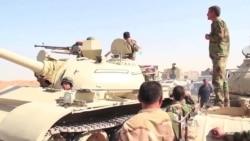In 2004, Middle East expert Joshua Landis followed the advice of an academic colleague at the University of Oklahoma and started a blog called Syria Comment. To his surprise, tens of thousands of people around the world began reading the online material and sent speaking invitations from far and wide.
Landis is scaling back his blogging, but he remains intensely focused on the region through his role as the director of the university’s Center for Middle East Studies.
The Civil War in Syria and the Islamic State group’s rapid seizure of land in both Syria and Iraq have challenged and confused Western policymakers. One way of understanding what is happening there is to look at Central Europe a half century ago, Landis said.
“During World War II there was a great sorting out," he said. "Poland was 64 percent Polish before World War II; by the end of World War II, it was 100 percent Polish. Czechoslovakia had 32 percent minorities; all of them are gone. This is true right down Central Europe.”
Landis said a great sorting out is taking place in the Middle East now as fighters united by a fervent transnational Islamic identity expel Christians, Jews and other minorities and seize territory from traditional rulers.
“All across the Middle East you had secular nationalist leaders," he said. "They are being wiped away, and we are getting a new world of religious nationalism.”
Landis said the United States is obligated to help Iraq fight IS because the uprising is a result of the U.S. intervention in that nation, but the goal is far from clear. His advice to policymakers is to intervene less, not more.
“I guess it is a plea for modesty and a bit of a sense that America really cannot control this region,” he said.
“Instead of arming various groups," Landis added, "try to keep the various factions from being armed. Convince the Iranians and the Saudis not to send in arms. We shouldn’t be doing it ourselves and facilitating it, because the more arms you throw in, the bloodier these civil wars become.”
Landis said college students around the United States are signing up for classes on Middle East culture, history and politics partly because of their interest in understanding the strife they see in the news every day.





